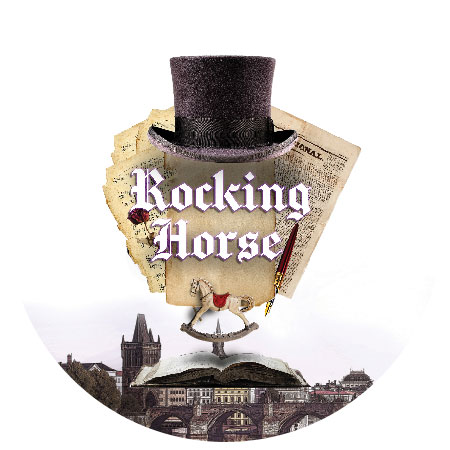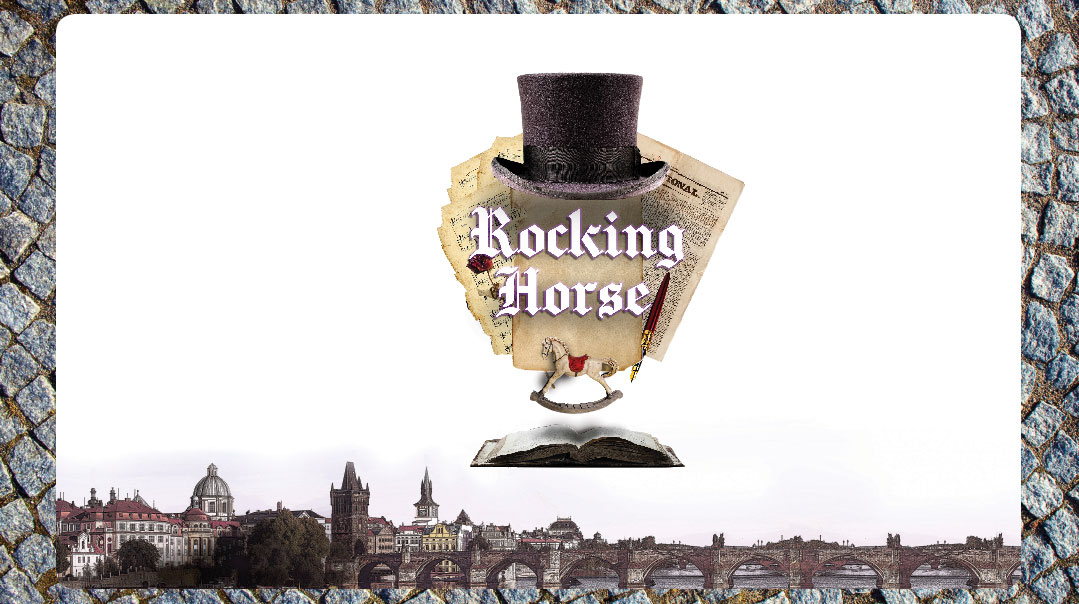Rocking Horse: Chapter 31

Mama is the mother, she’s meant to be the sun of their family. And she acts more like the moon, reflecting back others’ light

Wilhelm pries the cork off the bottle and splashes the wine into two flute glasses. He raises the glass. “To moving on with life.”
Felix watches, hesitating, before the lure of a wineglass in hand decides for him. He raises his glass. “To stepping back into the unknown.” He sips, allows the wine to linger in his mouth before he swallows. It is a good vintage. Not what he would have expected from Wilhelm.
“Papa gave me the key to the wine cellar,” Wilhelm says, pouring himself a second glass.
“In honor of?”
A big announcement is coming, surely. While Felix writes stories about Hans and Bertha (the latest: Hans and Bertha visit their elderly relatives on a sled, bringing them pastries that Mama has ordered the servants to prepare especially for them), Wilhelm is moving on. Not only that, he deserves a charged glass.
Perhaps he is going to be one of the handful of Jews offered a teaching position in Berlin University. Maybe he is to become a minor government officer or he has been offered a place in the office of a diplomat. Something that will allow his mother to boast and mute his father’s penchant for criticizing his offspring.
“You, of course.”
Felix blinks. “Me?”
Wilhelm takes a large swallow. “Oh, the innocence of babes.”
Felix sets down his glass and paces the room. “Abandoning your dissertation and taking a dead-end job writing a children’s supplement can hardly be called moving on with life.” He turns and faces Wilhelm, surprised at the agitation filling him.
Wilhelm chuckles. “Do you know that the entire city is talking about your piece?”
He looks up. Who, exactly, reads page five of the newspaper? Other than desperate balding men, attracted by the advertisements for hair restoral cream. He rubs his own hand over his thick, curling, brown locks. His father’s heritage — Papa still has an enviable head of hair in his early fifties.
Felix reaches for the bottle and refills the glass. Wilhelm’s eyes widen. “When is the last time you were in a coffee shop? And what about shul on Shabbos?”
He blushes. “With Mama away—”
“You simply turn over and go back to sleep on Shabbos morning.”
Felix nods.
“And thus you had cholent for breakfast, with nary a coffee beforehand.”
“It was easier than I had feared.”
A pause. They look at each other, and the easy brotherhood has gone, though Felix cannot understand it. He forces himself to speak. “The rest of the time, I am in the printer’s shop, or here, bent over the table, writing.”
He doesn’t say that he spends time, too, at Chasya. Playing with Leibele. She has even learned to trust him with the baby. Often they sit companionably as she spoons soup into Leibele’s mouth — the little boy can do it himself, but since the baby came, he likes to be fed.
Wilhelm clicks the roof of his mouth and shakes his head. “Sad business, this. Leaving childhood behind and being compelled to make a mark on the world. Though it did bring my father to open his wine cellar. I think he hopes that whatever it is that you are doing will rub off on me.”
“There might be hope.” He wants to hear more. “The article. Your father read it?”
Wilhelm counts off on his fingers. “My father. My mother. My sisters took the article with them to their embroidery circle and read it out loud. Interesting how we all got very busy with the mechanics of how to help the immigrants as they pass through Prague, but none of us really stopped and thought about why they are running, what they are running from.”
Something in him softens. In the kitchen, Gertrude is clearing up from dinner. He hopes that she will not pilfer the leftover chicken — he had planned to send it over to Chasya.
“It is true,” he says at last. “We are all so busy thinking about how they live in primitive conditions that we forget that even primitive living is home, and to be shaken out of your home, there needs to be some kind of threat.”
Primitive. His mind flits to Mama and Emmy. He hopes they are not cold.
“As my mother keeps saying, not only did you tell us about the threat, you made us feel it.”
Felix nods. Wilhelm is kind. To come, and to try and celebrate with him. But somehow, he feels that his old friend understands nothing, nothing at all. He is glad that the article has had some kind of an impact, but there is no triumph here — how can there be, when old Jewish women and young mothers and little children are forced to leave their homes, and wander across Europe, living off the crumbs of human kindness.
Tatte looks up from his sefer as Hannah finishes her bowl of porridge. She licks the spoon. “It must be the milk. The milk here is thicker, creamier, there’s a taste…”
Mama looks in from the kitchen. “It’s the taste of home.” She reaches out and brushes Hannah’s cheek. They’ve been here a few days, but Mama keeps blinking as she looks at Hannah, as if to make sure she’s real.
Mama points to the bedroom, and mouths, “Is she awake?”
“Emmy? No. Sleeping like a baby.”
Mama holds herself a little aloof from Emmy. She’s nervous. She acts the same way to Ernst, and no matter how many times Hannah has said, no one came to judge, they just want your warmth. It doesn’t help. Which annoys her.
Mama is the mother, she’s meant to be the sun of their family. And she acts more like the moon, reflecting back others’ light. Why are you so uncertain? She wonders. You, who knows so much, who has so much wisdom? Don’t you have enough to enfold Emmy into your family?
Her mother picks up her bowl, takes it into the kitchen, and refills it. “Mama… I can’t manage another spoonful.”
Her mother’s face falls, and Hannah feels bad for denying her mother a moment of pleasure. She jumps up and pulls out a chair. “Sit down, Mama.” Her mother sits, and Hannah notices her hands shake slightly as she places them onto the armrests. She reaches over and covers her mother’s hand with her own. How soft and thin is her mother’s skin, as if there is almost nothing there.
She bites her lip. How can she have been so self-absorbed? So busy with her own life, that she had suspended in time the people she loves, paused their lives, while she agonized over Emmy and Felix and Ernst. And all that time, her mother’s skin grew translucent with age, and her back bending over as if she must bow to the world, to G-d, to suffering.
“What are you doing today?” Tatte asks.
Hannah shrugs. “Maybe I’ll make some latkes for tonight. I’ll show you the way we make them in Prague.” Before she left, Ernst handed her a wad of money and told her, “While you are there, make sure that your parents eat well each night.”
Here’s the thing: money will buy a chicken to eat, but who will take the chicken to the shochet? Who will pluck the feathers and kasher it? She would do it herself, but feels pulled to go visiting, or to be with Emmy. And she does not want to impose the work on her mother, who may feel not that it is a gift, but a criticism of the way they live. So instead she uses the money to buy more eggs, cheese, and before Shabbos , she will tell her mother to choose the biggest, fattest hen she can find.
Next visit, she will bring Gertrude along with her, and then they will buy a chicken every night.
Tatte eases himself up and ties on the large apron that he wears in the dry-goods store. “If you want to go to the beis olam, it has to be today.”
“Why today?”
“Tonight is Chanukah. It is not fitting to go on Chanukah.”
She nods slowly, heart sinking. Emmy will not be pleased. The beis olam was not on her plan. But it would be unthinkable for her to return to Prague without visiting the kevarim of her grandparents. And during Chanukah, it would not be fitting to go.
She lets out a little sigh. She fought the kasha battle for Emmy. But this time, Emmy will have to give in.
Hannah shivers. Why is it that she is suddenly cold in her thick, woolen city coat? She doesn’t remember being cold when she was a girl, and then she only had a shawl to cover her. Emmy points: “And whose kever is this?”
Hannah leans over and reads the inscription, although she knows who is buried there, everyone does. She stoops down and picks up a pebble, which she places on the gravestone.
Shlomo ben Avrohom
“They used to live over there.” She waves a hand, vaguely, to the other side of the village. “His mother died not long before he did. The gravestone is somewhere around here. She was a friend of Mama’s.”
Some kind of winter illness had hit the family. It happens every year, but that doesn’t stop it hurting. And when Succos is over and the wind blows sharp, every woman in the village says a special techinah to keep the winter sickness away from her family.
She remembers the boy. He was a few years older than Schneur, a leibedige kind, her father had always called him, and the rumor was that his mother had stitched him a special pillow, filled with duck feathers, that he wore under his shirt to absorb the blows of the melamed.
Emmy leans over the gravestone. “He was only 16 when he died.”
“Yes. It was… sad.”
Hannah doesn’t say the end of the story, the part that really made the village draw in a collective breath. The morning after they got up from shivah, the boy’s brother, just 15 and smarting not from the melamed’s switch, but from the blows of the angel of death, had taken his tefillin, hung them over the tree in the schoolyard. The black straps dangled from the boughs of the yew tree.
And he had gone off to seek his fortune. Maybe to Warsaw. Maybe to Berlin. He was never again seen in the village.
“And his brother… left his past behind.”
She sees things shifting in her daughter’s brain. She wants to say, you know, when you live in the city, you think of the people in the shtetl as being bland. There’s a predictability to their lives. Maybe their emotions are muted, maybe they seem as placid as the cows chewing the grass in the fields.
But that’s a falsehood. Wherever man lives, whatever is the shape of his life — a villager or city dweller, one who learns in cheder or Normalschule, whether he owns a tavern or a violin — his life is his life. It is his ink on the pages of his years. And it is his blood that makes up the ink.
to be continued…
(Originally featured in Family First, Issue 700)
Oops! We could not locate your form.


